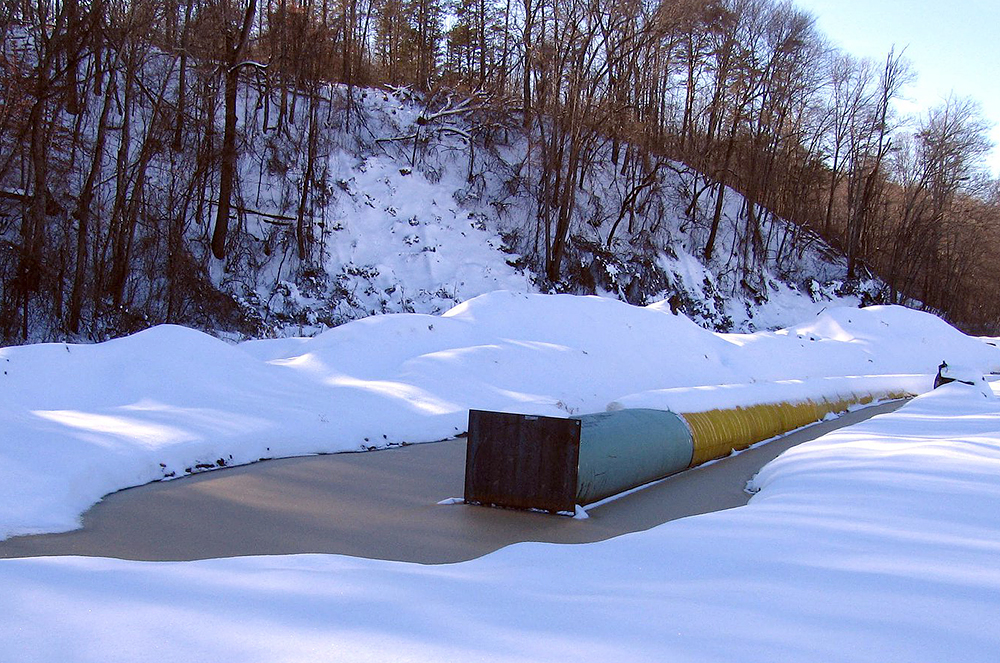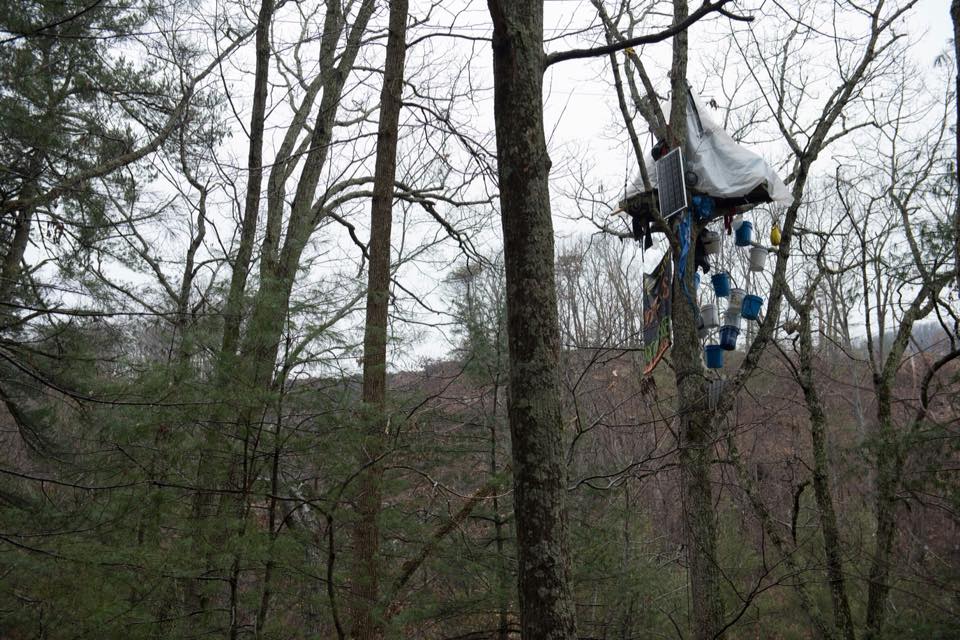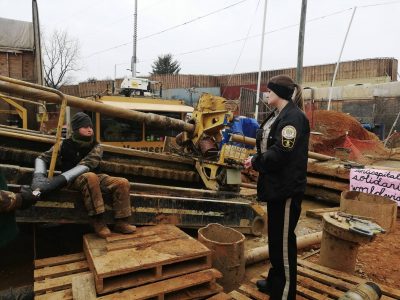Kevin Ridder | February 13, 2019 | No Comments
 Developers of the fracked-gas Mountain Valley and Atlantic Coast pipelines face mounting pressure from the onslaught of delays and cancelled permits. Construction is still on hold along the entirety of the Atlantic Coast Pipeline due to numerous court cases, save for places where the company says it is needed to prevent environmental degradation. Construction is also halted in numerous places along Mountain Valley’s route.
Developers of the fracked-gas Mountain Valley and Atlantic Coast pipelines face mounting pressure from the onslaught of delays and cancelled permits. Construction is still on hold along the entirety of the Atlantic Coast Pipeline due to numerous court cases, save for places where the company says it is needed to prevent environmental degradation. Construction is also halted in numerous places along Mountain Valley’s route.
In February, Dominion Energy pushed back the completion date for the Atlantic Coast Pipeline from 2020 to 2021 and stated the project could cost up to $7.5 billion, a $500 million increase from fall 2018 estimates. When Dominion first announced the pipeline in 2014, the monopoly utility set an in-service date of 2019 with a price tag of up to $5 billion.
On Dec. 7, the U.S. Fourth Circuit Court of Appeals suspended a key permit that would have allowed Atlantic Coast developers to cut through the habitat of threatened and endangered species. The court set a hearing for March 19, which displeased lead Atlantic Coast developer Dominion Energy, stating that each week construction sits idle costs $20 million. The judges refused Dominion’s request to move the hearing to late January.
If construction of the fracked-gas pipeline is not approved before the end of March, Atlantic Coast developers will be unable to legally down trees until November due to migratory bird laws.
On Dec. 13, the federal court threw out a U.S. Forest Service permit that would have allowed the pipeline to cross two national forests and the Appalachian Trail. Citing this decision, the U.S. National Park Service asked the federal court if it could withdraw and reconsider one of its permits under litigation rather than await a court decision. The Fourth Circuit Court granted the agency’s request on Jan. 23. The permit, which would have allowed the pipeline to run underneath the Blue Ridge Parkway, was cancelled by the court in August 2018.
The Mountain Valley Pipeline is also facing obstacles, although construction continues in some places.

A section of the Mountain Valley Pipeline sits in frozen rainwater in Anne Way Bernard’s Franklin County, Va., field. Photo by Anne Way Bernard
This comes about a month after two attorneys representing pipeline opposition group Preserve Bent Mountain told The Roanoke Times that they were seeking a federal criminal investigation into Mountain Valley’s construction activities. The attorneys allege that developers continued construction work in water bodies after a federal court struck down a U.S. Army Corps of Engineers stream-crossing permit in October due to a lawsuit brought by several environmental groups, including Appalachian Voices, the publisher of this newspaper.
In January, former Virginia State Water Control Board Member Roberta Kellam announced that she had provided a statement to the EPA’s criminal investigation division. Kellam, who had spoken critically of the Atlantic Coast and Mountain Valley pipelines during her time on the water control board, was dismissed by Virginia Gov. Ralph Northam less than a month before a vote on an Atlantic Coast compressor station was to take place.
Related: Virginia Approves Controversial Compressor Station
In a Virginia Mercury op-ed, Kellam writes that when she talked with DEQ Director David Paylor about people’s reports of conditions at Mountain Valley construction sites, he repeatedly told her that local residents were “untruthful.” Kellam also states that Paylor responded to her questions by accusing her of “working for the opposition.”
“Given the more than 300 water quality-related violations cited in Attorney General Herring’s complaint, photographs and personal accounts of local residents and my own observations on the ground, I feel confident that my concerns about water quality were well-founded and relevant to my sworn duty as a State Water Control Board member,” Kellam writes.
On Dec. 7, Virginia Attorney General Mark Herring and the state Department of Environmental Quality filed a civil lawsuit against Mountain Valley developers for violating state water protections. In a press release, the DEQ states that an independent inspection contracted by the agency identified more than 300 violations between June and mid-November of 2018, the majority being poor erosion control and stormwater management.
“We’re asking the court for an enforceable order that will help us ensure compliance going forward, and for penalties for MVP’s violations,” said Herring. In response, Mountain Valley spokesperson Natalie Cox released a statement blaming the violations on “unusually wet conditions and periods of record rainfall” in 2018. Environmental advocates have called on the DEQ to issue a stop-work order.
On Feb. 5, the Fourth Circuit Court ruled against people in the path of the Mountain Valley Pipeline by upholding a federal judge’s February 2018 decision to allow pipeline developers to use eminent domain to seize about 300 properties without paying the landowners up front. According to the Roanoke Times, an agreement between landowners and Mountain Valley on a fair price has yet to be reached in roughly one-third of those cases.
On Jan. 28, environmental groups including Appalachian Voices presented oral arguments to a federal court in favor of striking down the Federal Energy Regulatory Commission’s 2017 approval of the Mountain Valley Pipeline. Issues addressed by the groups include whether there is a public need for the pipeline and if the use of eminent domain to seize private land was warranted.
The U.S. Circuit Court of Appeals for the District of Columbia is expected to issue a decision within six months.
In January, the West Virginia Department of Environmental Protection reopened a public comment period for the Army Corps’ stream crossing permit that was struck down in October. Written comments will be accepted through March 4, delaying the project even further.
Protestors have been blocking Mountain Valley construction in stands erected high in the trees for more than 150 days in Elliston, Va.

Tree-sitters have been blocking Mountain Valley Pipeline construction in Elliston, Va., since Sept. 5. Photo courtesy of Appalachians Against Pipelines
According to pipeline resistance group Appalachians Against Pipelines, Mountain Valley security monitor the camp 24/7. On Dec. 28, pipeline developers asked a federal judge to order the tree-sitters off their stands, stating that they have a right to the land through eminent domain. Mountain Valley wants the judge to fine the tree-sitters and authorize the U.S. Marshals to forcibly remove them if they don’t comply.

On Feb. 1, a protestor locked themselves to Mountain Valley Pipeline construction equipment in Pittsylvania County, Va., stopping work for part of the day. They were later extracted, charged with trespassing and released. Photo courtesy of Appalachians Against Pipelines
Mountain Valley also wants the injunction to apply to “the agents, servants, employees, and attorneys of the tree-sitters and to all other persons who are in active concert or participation with them,” according to The Roanoke Times. Opponents of the pipeline decried this as a violation of the constitutional right to legal counsel.
The judge had yet to issue a decision as of mid-February.
In February, Pennsylvania regulators indefinitely suspended construction permits for Energy Transfer Partners’ Mariner East 2X and Revolution pipelines due to the company’s track record of violations and failure to remedy them. The company’s Mariner East 2 Pipeline in Pennsylvania, which received 92 state-issued violations during construction before entering into service on Dec. 29, is still pumping natural gas liquids to be used for plastic production domestically and abroad.
This follows the state’s January decision to suspend service on ETP’s Mariner East 1 Pipeline after a sinkhole exposed a section of the pipeline in a resident’s backyard.
The state Department of Environmental Protection issued the February decision after finding that ETP had was not fixing problems associated with the Revolution Pipeline. A section of the pipeline exploded and destroyed a house, a barn and several cars in September after being in operation for only seven days.
Energy Transfer Partners is also behind the controversial Dakota Access Pipeline and the Bayou Bridge Pipeline in Louisiana.
A field in Wayside, W.Va., that serves as a pasture for rescued horses is being bisected by the Mountain Valley Pipeline. According to horse rescuer Arietta Ann DuPre, Mountain Valley and its contractors have broken most of their promises and endangered the lives of both her and her animals. Read her story at appvoices.org/arietta.
In late 2018, Virginia pipeline opponent Sarah Murphy and her horse, Rob Roy, traveled the Virginia and West Virginia route of the Atlantic Coast Pipeline to raise awareness. She plans to travel the N.C. route in spring. Read more at appvoices.org/acp-horse.
Editor’s Note: This article was updated on Feb. 13, 2019, from the print edition to include new information, and again on Feb. 19 to confirm the existence of a federal criminal investigation against the Mountain Valley Pipeline.
Like this content? Subscribe to The Voice email digests